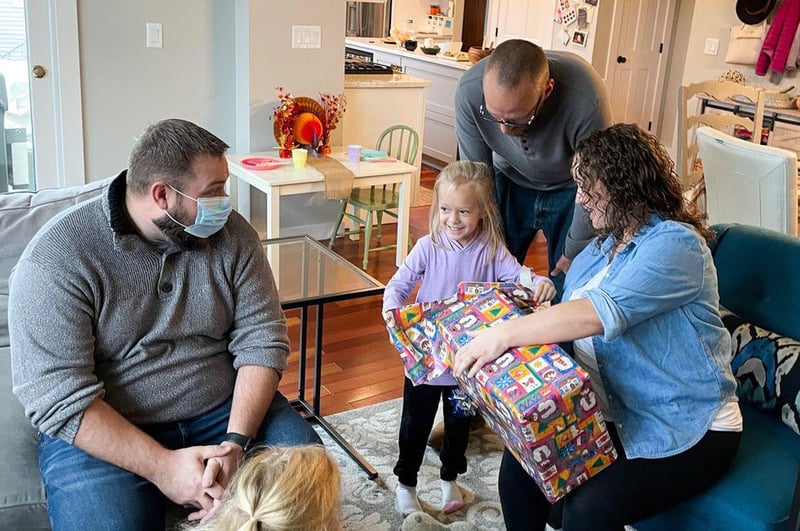(330) 876-1228
8507 Main StreetKinsman, OH 44428
(330) 876-1229

For Emily Litvin, this Thanksgiving is going to look different from the last one and she couldn't be happier about it.
"I'm so excited to have some sort of normalcy, especially for my daughter and her cousins. It's nice for them to all get together and experience the traditions that we grew up with," said Litvin, a schoolteacher who lives near Columbus, Ohio. "We're so excited."
But a new survey has found that many Americans will be tempering their excitement with some caution: Researchers from Ohio State University's Wexner Medical Center discovered that nearly three-fourths plan to celebrate only with household members, and 46% would require unvaccinated guests to test negative for COVID-19.
"Whereas I had assumed that most individuals had moved pretty far back to their normal behavior when it comes to masking and physical distancing and limiting crowd sizes and things like that, I was surprised to see how many people were actually still considering mitigation strategies," said Dr. Iahn Gonsenhauser, chief quality and patient safety officer at Wexner.
About half also said they would ask their guests to wear masks. That's compared to 67% of respondents surveyed in 2020.
"If you know that everybody in your party is vaccinated, you can really have a pretty normal Thanksgiving and holiday season, but you have to be fairly certain that that's reliable information," Gonsenhauser said. "If you have any suspicion, any concern that individuals may not be forthcoming about their vaccine status, then in that case masks and other risk mitigation strategies are still appropriate."
Gonsenhauser said he personally would require unvaccinated guests to wear a mask and he'd want to know if anyone was unvaccinated and unmasked at an event he was planning to attend. He acknowledged those conversations could be awkward.
It is possible to gather where all eligible people are vaccinated and there are a couple of children ages newborn to 4 who are too young for approved vaccines, he said, because that is a very low-risk environment.
Gonsenhauser thinks people are feeling cautious because they're afraid of having to deal with yet another wave of the virus after living through it the past 20 months.
Many families will still use caution
"I think everybody's tired of the toll that this has taken on us. And they have recognized that there are some very small things that we can do, almost insignificant, that can significantly decrease our risk," Gonsenhauser said.
Dr. Susan Kline is a professor of medicine in the Division of Infectious Diseases and International Medicine at the University of Minnesota Medical School. "I think people are still being cautious," she said. "And I think right now that's appropriate, given the fact that we know in some states and some communities there's still quite a bit of COVID circulating in public."
Kline herself is planning to travel to visit family this holiday season, though she did last year as well.
While in 2020, she chose to travel by car instead of fly, disinfected surfaces in public places and wore masks in the homes of the family members she visited. Kline plans to take some of those precautions again this year.
"I think we're in a much better place this year because so many people have been vaccinated. And I think that will make people's family gatherings safer and allow some people to travel more or gather more with friends and family compared to last year," Kline said.
Last year, Litvin, her husband and young daughter canceled Thanksgiving plans because of the pandemic. They celebrated Christmas in a "bubble" with only their parents and siblings.
This year, she is expecting her second child, is vaccinated and has also recovered after being infected with COVID-19. But she still plans to continue to take some precautions, including celebrating in a group that is mostly vaccinated.
"This is just going to be such a blessing and such a celebration to be back together and having some not completely normal, but somewhat normalcy to our traditions," Litvin said.
Dr. Jennifer Shu is an Atlanta-based pediatrician and a mom of two, ages 11 and 20. While the family's holiday plans were minimal last year, this year she feels like it would be safe to do more.
She hasn't decided yet whether to travel.
"This winter, my concern is my parents. They're older and I guess I would just feel awful if one of us got them sick. So, I'm just being a little bit cautious about that. If everyone's vaccinated and boosted where appropriate, then I would consider doing some travel, but I'm being cautious," Shu said.
Shu has not seen any COVID cases among her pediatric patients the past couple months, but has heard recently about COVID exposures from gatherings like birthday parties.
"I think that the message is if everyone's vaccinated, you can probably go see people, but still use caution," Shu added. "We're not back to pre-pandemic times yet."
More information
The U.S. Centers for Disease Control and Prevention has more on COVID-19 holiday precautions.
SOURCES: Iahn Gonsenhauser, MD, chief quality and patient safety officer, Ohio State Wexner Medical Center, Columbus; Susan Kline, MD, professor, medicine/division director, Division of Infectious Diseases and International Medicine, University of Minnesota Medical School, Minneapolis; Jennifer Shu, MD, pediatrician, Children's Medical Group, Atlanta; Emily Litvin, Columbus, Ohio; "Survey finds most Americans will still use COVID precautions this holiday season," Ohio State University Wexner Medical Center, Nov. 15, 2021
